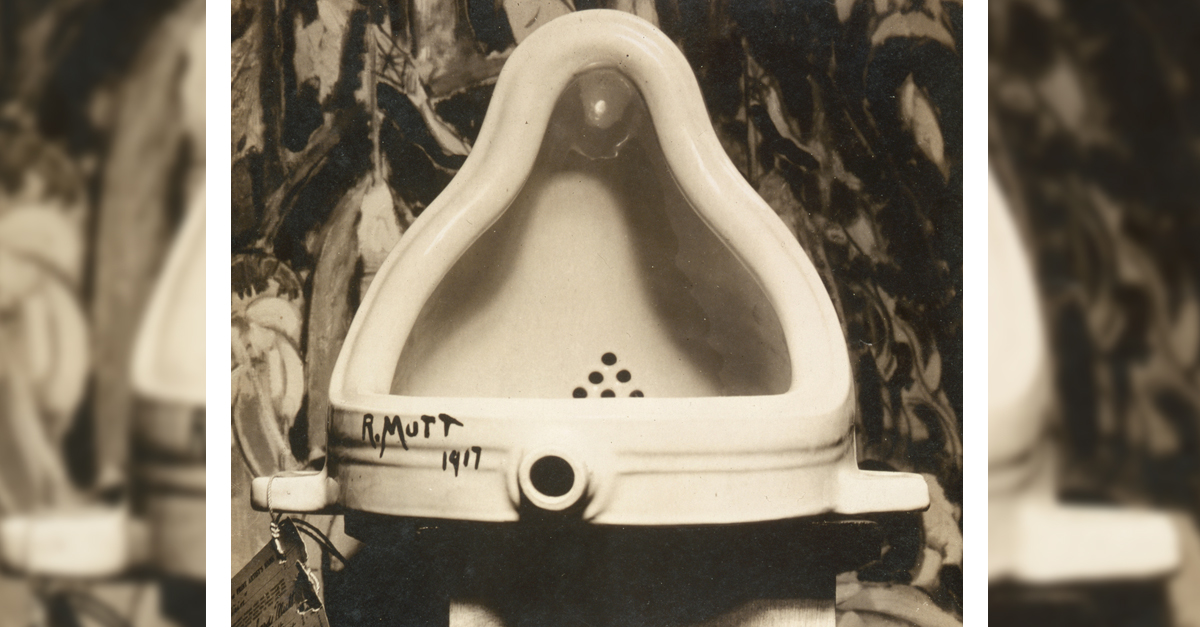One of the most influential sculptures of the 20th century...is a urinal. And it's not a likeness of a urinal carved from marble or anything. It's just a urinal, bought at a hardware store. It's Marcel Duchamp's Fountain, and people still argue about it over 100 years since its creation.
Art Of The Mind
Marcel Duchamp was a key figure in the avant-garde art movement of the early 20th century. Contemporary critics place him as one of the three most influential artists of the era, along with Picasso and Matisse. But Duchamp had slightly different ideas about "art" from many of his peers. The biggest departure was this: Duchamp didn't think art had to look good. In fact, he didn't want his art to look good.
Duchamp decried the majority of art as "retinal," designed only to please the eye. Duchamp was far more interested in creating art for the mind—and because of that, he created some of the most bizarre, original, and controversial works in history.
 Flickr, Steven Zucker, Smarthistory co-founder
Flickr, Steven Zucker, Smarthistory co-founder
Avant-Garde
Though Duchamp received classical training, and his early works like The Chess Game could certainly be described as "retinal," as he got older his ideas about art evolved. His paintings started drawing heavily on Cubist influences, and they grew far more abstract. But that was just the beginning.
This brings us to New York City in 1917, where the French Duchamp had fallen in with the American artists of the early Dada art scene. The town was abuzz with rumors that Duchamp, already a well-known artist, was working on a Cubist painting called Tulip Hysteria Co-ordinating. But when the Society of Independent Artists held its 1917 exhibition, the painting was nowhere to be seen.
In fact, there weren't any pieces by the French artist. At least, not on display.
Fountain
Most historians believe that Tulip Hysteria Co-ordinating never really existed. Duchamp was already far more interested in what he called "readymades": An ordinary object that an artist gives meaning through selection and modification. An ordinary object like, say, a urinal.
Duchamp purchased a standard urinal from a hardware store on Fifth Avenue. He tilted it 90 degrees so that it lay on its back. Then he signed it, "R. Mutt, 1917" (a mostly-nonsense name just chosen to throw people off his scent), titled the piece Fountain, and that was that.
He submitted the piece to the Society of Independent Artists exhibition under a pseudonym, and it immediately sparked debate.
 Alfred Stieglitz, Public domain, via Wikimedia Commons Marcel Duchamp's 1917 sculpture Fountain.
Alfred Stieglitz, Public domain, via Wikimedia Commons Marcel Duchamp's 1917 sculpture Fountain.
Suppressed Art
The board of the Society of Independent Artists argued heavily about Fountain, and eventually, they decided they couldn't simply display a urinal as art. When the day of the exhibition came, they hid the piece behind a partition. But this wasn't the last they'd hear of R. Mutt's urinal.
Not long after the show, New York Dada artists defended the piece and decried its "suppression". In their magazine The Blind Man, several proto-Dadaists published essays defending the urinal. The magazine also included a photograph, which has since become one of the most enduring images in the history of modern art.
Can A Urinal Be Art?
But the debate rages on. Can a urinal, merely through the act of selection by an artist, become art? Both sides still have staunch proponents. But if Duchamp's goal was to create something that stimulated the mind, more than a century of debate over a urinal certainly seems like a success.
Want to see Fountain for yourself and decide whether or not it's art? Well...too bad. The sculpture was lost almost immediately after the exhibition. The best guess as to what happened to it? Someone thought it was garbage and threw it out. Honestly, a fitting end for one of the most controversial works of art in history.












